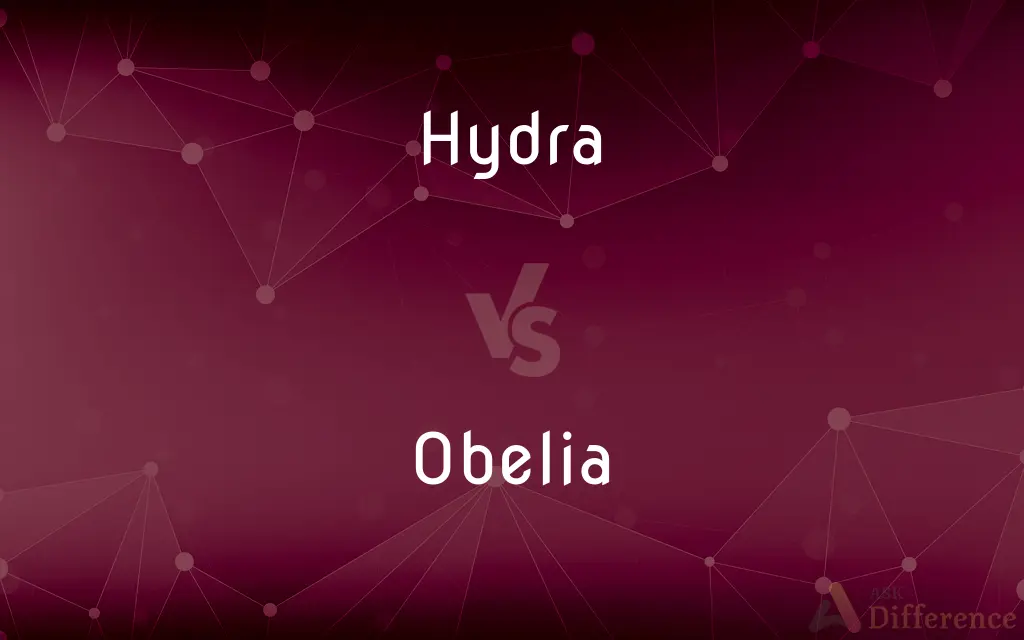Hydra vs. Obelia — What's the Difference?
By Urooj Arif & Fiza Rafique — Updated on March 16, 2024
Hydra is a solitary freshwater organism, while Obelia is a colonial marine organism.

Difference Between Hydra and Obelia
Table of Contents
ADVERTISEMENT
Key Differences
Hydra is a simple, solitary organism found in freshwater habitats, known for its regenerative abilities. Obelia, in contrast, is a complex, colonial organism living in marine environments, consisting of a community of interconnected individuals.
Hydra is characterized by a tubular body with a mouth surrounded by tentacles at one end, using these tentacles to capture prey. On the other hand, Obelia forms branched colonies of polyps specialized for feeding (gastrozooids) and reproduction (gonozooids), demonstrating a division of labor within the colony.
The diet of Hydra primarily includes small aquatic invertebrates, which it catches using nematocysts on its tentacles. Conversely, Obelia colonies capture plankton and small marine organisms, utilizing a similar mechanism of nematocysts for feeding.
Hydra's simplicity allows it to exhibit phenomenal regenerative capabilities, where even a small fragment of its body can grow into a complete organism. Obelia, while also capable of regeneration, demonstrates this ability through the colonial growth and repair, highlighting the difference in their regenerative contexts.
Comparison Chart
Habitat
Freshwater
Marine
ADVERTISEMENT
Lifestyle
Solitary
Colonial
Body Structure
Tubular body with tentacles
Branched colonies of specialized polyps
Feeding Mechanism
Nematocysts on tentacles
Nematocysts on gastrozooids
Regenerative Ability
High, can regenerate from fragments
Present in colony growth and repair
Compare with Definitions
Hydra
A genus of small, freshwater organisms from the phylum Cnidaria.
The hydra can regenerate its entire body from a small piece of tissue.
Obelia
A genus of colonial marine cnidarians.
Obelia colonies are common in marine environments, attached to rocks or seaweed.
Hydra
Captures prey with nematocysts.
Hydra immobilizes its prey using specialized cells called nematocysts.
Obelia
Forms branched colonies of polyps.
Each Obelia colony consists of feeding and reproductive polyps.
Hydra
Possesses a simple body structure with tentacles.
Hydra uses its tentacles to catch prey.
Obelia
Specialized polyps for feeding and reproduction.
In Obelia colonies, gastrozooids are responsible for feeding.
Hydra
Known for its regenerative capabilities.
Hydra's ability to regenerate is studied in cellular biology.
Obelia
Utilizes nematocysts for capturing prey.
Obelia gastrozooids capture plankton using nematocysts.
Hydra
Greek Mythology The many-headed monster that was slain by Hercules.
Obelia
Has a life cycle including polyps and medusae.
Obelia's life cycle alternates between sessile colonies and free-swimming medusae.
Hydra
(Astronomy)A satellite of Pluto.
Obelia
Obelia is a genus of hydrozoans, a class of mainly marine and some freshwater animal species that have both polyp and medusa stages in their life cycle. Hydrozoa belongs to the phylum Cnidaria, which are aquatic (mainly marine) organisms that are relatively simple in structure.
Hydra
A constellation in the equatorial region of the southern sky near Cancer, Libra, and Centaurus. Also called Snake2.
Obelia
Any of various marine hydroids of the genus Obelia that exist chiefly as colonies of polyps growing in a branchlike form on surfaces such as piers or rocks.
Hydra
A persistent or multifaceted problem that cannot be eradicated by a single effort.
Obelia
(zoology) Any of various colonial marine hydroids of the genus Obelia.
Hydra
Any of several small solitary freshwater hydrozoans of the genus Hydra and related genera, having a cylindrical body and a mouth surrounded by tentacles.
Hydra
Any of several small freshwater polyps of the genus Hydra and related genera, having a naked cylindrical body and an oral opening surrounded by tentacles.
Hydra
(fantasy) A dragon-like creature with many heads and the ability to regrow them when maimed.
Hydra
A complex, multifarious problem or situation that cannot be solved easily and rapidly.
Hydra
A serpent or monster in the lake or marsh of Lerna, in the Peloponnesus, represented as having many heads, one of which, when cut off, was immediately succeeded by two others, unless the wound was cauterized. It was slain by Hercules. Hence, a terrible monster.
Gorgons, and Hydras, and Chimeras dire.
Hydra
Hence: A multifarious evil, or an evil having many sources; not to be overcome by a single effort.
Hydra
Any small fresh-water hydroid of the genus Hydra, usually found attached to sticks, stones, etc., by a basal sucker.
Hydra
A southern constellation of great length lying southerly from Cancer, Leo, and Virgo.
Hydra
(Greek mythology) monster with nine heads; when struck off each head was replaced by two new ones;
Hydra was slain by Hercules
Hydra
A long faint constellation in the southern hemisphere near the equator stretching between Virgo and Cancer
Hydra
Trouble that cannot be overcome by a single effort because of its many aspects or its persistent and pervasive quality;
We may be facing a hydra that defies any easy solution
Hydra
Small tubular solitary freshwater hydrozoan polyp
Common Curiosities
How do Hydra and Obelia capture their prey?
Both use nematocysts on their tentacles or on gastrozooids (in Obelia's case) to immobilize prey, though their feeding strategies reflect their solitary versus colonial lifestyles.
Can both Hydra and Obelia regenerate?
Yes, both can regenerate, but Hydra is notable for its ability to regenerate from very small fragments, while Obelia demonstrates regeneration in the context of colonial growth and repair.
What is the main habitat difference between Hydra and Obelia?
Hydra is found in freshwater environments, while Obelia lives in marine settings.
What distinguishes the body structure of Hydra from Obelia?
Hydra has a simple, tubular body with tentacles, whereas Obelia forms branched colonies with specialized polyps for feeding and reproduction.
What is the significance of the tentacles in Hydra and Obelia?
In both organisms, tentacles equipped with nematocysts play a crucial role in capturing prey and defense.
Are Hydra and Obelia considered similar in terms of complexity?
No, Hydra is considered a simpler, solitary organism, while Obelia is more complex due to its colonial structure and division of labor.
What are the reproductive polyps called in Obelia?
In Obelia, the reproductive polyps that produce medusae are called gonozooids.
What type of organisms do Hydra and Obelia typically feed on?
Hydra preys on small aquatic invertebrates, while Obelia captures plankton and other small marine organisms.
Can Hydra live in saltwater environments?
Hydra is adapted to freshwater and does not typically survive in saltwater environments.
How do scientists study the regenerative abilities of Hydra?
Researchers study Hydra's regenerative processes at the cellular and molecular levels to understand mechanisms that could have implications for regenerative medicine and biology.
Is Obelia found in freshwater habitats like Hydra?
No, Obelia is exclusively marine and is not found in freshwater habitats.
How does the colonial lifestyle of Obelia benefit its survival?
The colonial lifestyle of Obelia allows for specialization of polyps, improving efficiency in feeding and reproduction, and offers better protection against predators.
Share Your Discovery

Previous Comparison
Errand vs. Work
Next Comparison
Chapter vs. SectionAuthor Spotlight
Written by
Urooj ArifUrooj is a skilled content writer at Ask Difference, known for her exceptional ability to simplify complex topics into engaging and informative content. With a passion for research and a flair for clear, concise writing, she consistently delivers articles that resonate with our diverse audience.
Co-written by
Fiza RafiqueFiza Rafique is a skilled content writer at AskDifference.com, where she meticulously refines and enhances written pieces. Drawing from her vast editorial expertise, Fiza ensures clarity, accuracy, and precision in every article. Passionate about language, she continually seeks to elevate the quality of content for readers worldwide.
















































